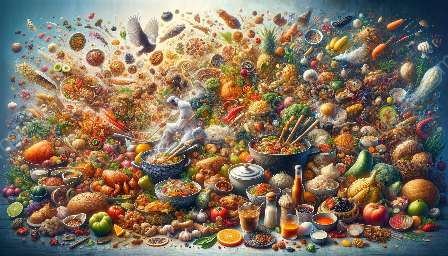Globalization and culinary exchange have significantly impacted food cultures around the world. The interconnected nature of our modern world has led to an unprecedented sharing of culinary traditions, ingredients, and techniques. This has been further influenced by the migration of people, which has played a significant role in shaping the food culture of various regions. It is essential to recognize the historical context of food culture to understand how globalization and migration have influenced it. This topic cluster will delve into the fascinating interplay of these concepts, providing comprehensive insights into the evolution of global food cultures.
The Interconnected World of Culinary Exchange
Globalization has facilitated the global exchange of culinary traditions and ingredients, leading to a rich tapestry of cross-cultural influences in food. This exchange has resulted in the fusion of flavors, the introduction of new ingredients to different regions, and the adaptation of traditional dishes to suit diverse palates. The access to global markets has enabled the availability of once-local ingredients and foods in far-flung corners of the world, creating new opportunities for culinary experimentation and innovation.
Impact of Migration on Food Culture
Migration has historically been a significant factor in shaping food cultures. As people move to new regions, they bring their culinary traditions with them, leading to the amalgamation of diverse cooking styles, flavors, and ingredients. This has given rise to new hybrid cuisines that authentically reflect the multicultural nature of modern societies. Furthermore, migration has driven the demand for familiar foods from home countries, resulting in the establishment of ethnic enclaves and the proliferation of diverse food establishments, from restaurants to specialty grocery stores.
Exploring the Influence of Migration on Food Culture
The influence of migration is evident in the food cultures of various regions. For instance, the migration of Italians to North and South America resulted in the diffusion of Italian cuisine, leading to the popularity of dishes such as pizza and pasta worldwide. Similarly, the migration of people from Southeast Asia to Western countries has introduced the flavors of Thai, Vietnamese, and Indonesian cuisines to global audiences, leading to their widespread appreciation and integration into mainstream culinary landscapes.
The Historical Context of Food Culture
Understanding the historical context of food culture is essential for appreciating the depth of its evolution. Traditional culinary practices often have deep-rooted historical significance, shaped by factors such as trade routes, conquests, and cultural exchanges. By tracing the historical trajectories of specific food traditions, one can gain insights into how they have been influenced and transformed by globalization and migration over time.
Connecting Globalization, Culinary Exchange, and Migration's Impact
The interconnectedness of globalization, culinary exchange, migration, and historical food culture is evident in the diverse array of dishes encountered in today's culinary landscape. This amalgamation of influences has not only enriched the variety of available cuisines but has also fostered a greater appreciation for cultural diversity. The exchange of culinary knowledge and traditions has transcended geographical boundaries, resulting in an ever-evolving global food culture that is continually shaped by the movement of people, the integration of novel ingredients, and the adaptation of traditional recipes.
Conclusion
The dynamic interplay between globalization, culinary exchange, migration, and historical food culture has given rise to a vibrant global culinary tapestry. By recognizing and appreciating the multifaceted influences that have shaped food cultures worldwide, we gain a deeper understanding of the richness and diversity of global gastronomy. As we continue to embrace the interconnected nature of our world, it is essential to celebrate and preserve the culinary traditions that reflect the shared history and experiences of humanity.

